

Runny nose, clogged airways, tears, itchiness, rashes, cough… Pollen allergies, or pollinosis, turn spring into a dreaded dreary season for many of us. Some people who suffer from allergy even reach the point where going out isn’t an option anymore! Here is a selection of five plants that will help soothe and reduce bouts of pollen allergy.
Tarragon is a plant that is particularly effective against allergies. This plants contains compounds like coumarin and flavones that can extend the time between consecutive allergy inflammations. It’s very often recommended to reduce allergy-induced sinusitis, as it is to sooth skin rashes and itching. Tarragon essential oil displays powerful antihistaminic activity, mostly thanks to the concentrated methyl chavicol it contains.
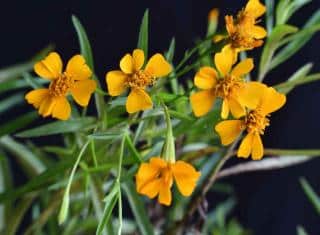 For five days in a row, ingest 2 drops of tarragon essential oil that you mix into a teaspoon of olive oil.
For five days in a row, ingest 2 drops of tarragon essential oil that you mix into a teaspoon of olive oil.
Pregnant and nursing women, and babies and children younger than 3 years old, should not use tarragon essential oil. You must also refrain from using it if you’re already taking anti-coagulant medication.
Apart from its diuretic and purging properties, nettle also has some value as an antihistaminic agent. As soon as the first allergic symptoms appear, this plants helps counter allergy-induced sinusitis, by slowing the flow of mucus out of the nose. In addition, nettle contains high levels of vitamin C, which helps the body absorb quercetin and, as a consequence, reduces hay fever symptoms.
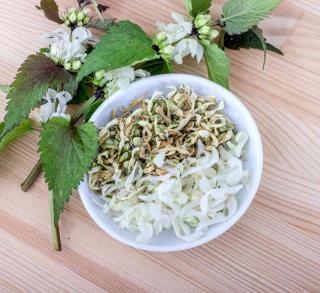 Dosage
DosageDried nettle leaves can be steeped to prepare an infusion. In a mug of boiled water, steep a teaspoon of dried, crushed nettle leaves for about ten minutes. You can drink up to three mugs of this tea per day.
Pregnant and nursing women, and children younger than 12 years old, should not ingest nettle. This plant is also contra-indicated in case of edema and prostate cancer.
Thyme helps decongest airways which is interesting to alleviate suffering related to hay fever.
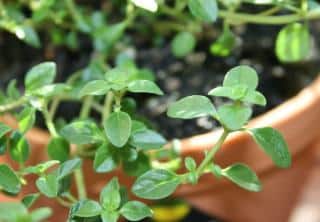 This plant can also be administered in the form of an infusion, about one teaspoon of thyme together with one teaspoon of echinacea for 1 quart boiling water (40 cl). Drink up to three mugs of this tea per day, ideally with a spoonful of thyme honey. Don’t pursue this course for more than 3 weeks. Thyme is also suitable for steam inhalation. In a bowl of hot water, pour a single drop of thyme essential oil.
This plant can also be administered in the form of an infusion, about one teaspoon of thyme together with one teaspoon of echinacea for 1 quart boiling water (40 cl). Drink up to three mugs of this tea per day, ideally with a spoonful of thyme honey. Don’t pursue this course for more than 3 weeks. Thyme is also suitable for steam inhalation. In a bowl of hot water, pour a single drop of thyme essential oil.
Thyme should not be used if you’re allergic to plants of the Lamiaceae family. It’s also not recommended for persons who suffer from hypertension or who are taking anti-coagulant medicines. Thyme essential oil is contra-indicated for pregnant and nursing women, and it isn’t for young children either.
Thanks to rosmarinic acid in its compounds, rosemary helps counteract pollen allergy symptoms in the nose, throat and ears. More specifically, rosemary is known to quell the allergic inflammation that occurs around the eyes.
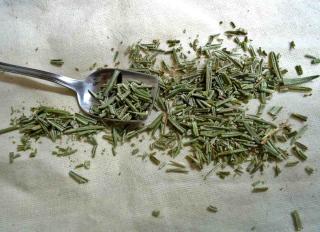 Rosemary is taken in the form of an infusion. Toss a few sprigs of rosemary in a mug full of boiling water and let steep for 10 minutes. You can ingest up to three mugs of this infusion per day.
Rosemary is taken in the form of an infusion. Toss a few sprigs of rosemary in a mug full of boiling water and let steep for 10 minutes. You can ingest up to three mugs of this infusion per day.
Rosemary infusions is contra-indicated for persons who suffer from hypertension, obstruction of the biliary tract, or who have a liver disease. In addition, it isn’t for children younger than 12 years old.
Black currant is an effective anti-inflammatory that succeeds in blocking the release of histamine, the molecule that triggers allergic reactions. On top of that, black currant contains high levels of manganese, a trace element that reinforces mucus linings in the breathing organs: healthy mucus linings reduces sensitivity to allergens. In this particular application, black currant bud extracts, much used in gemmotherapy, is a preferred solution to help people who suffer from chronic allergies.
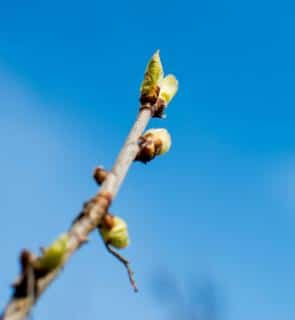 For adults and teenagers, add 5 to 15 drops of macerated blackcurrant buds in a glass of water. Drink this every morning for 3 weeks. Best is to ingest it 15 minutes before breakfast, without skipping breakfast. For children who are older than 3 years old, only count 1 drop per 20 pounds (10 kg) of the child’s weight.
For adults and teenagers, add 5 to 15 drops of macerated blackcurrant buds in a glass of water. Drink this every morning for 3 weeks. Best is to ingest it 15 minutes before breakfast, without skipping breakfast. For children who are older than 3 years old, only count 1 drop per 20 pounds (10 kg) of the child’s weight.
Macerated black currant buds not be used in any manner by children below the age of 3 nor by pregnant and nursing women. Persons suffering from heart or kidney failure should consult a doctor before taking any black currant berry or leaf supplements.
Related topic:
Your comment is awaiting moderation.